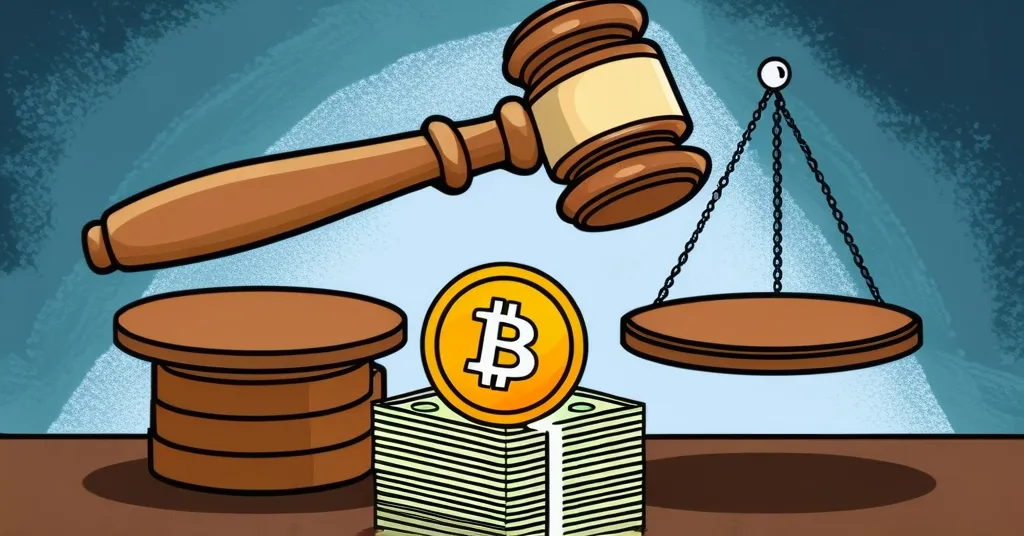Nigeria Sues Binance for $81.5 Billion: Economic Damage and Tax Evasion Claims

Nigeria Sues Binance for $79.5 Billion Over Alleged Economic Damage and Tax Evasion
Nigeria has launched a massive $79.5 billion lawsuit against Binance, the world’s largest cryptocurrency exchange, accusing it of causing significant economic damage and evading taxes. This legal action, which also seeks $2 billion in back taxes, marks a critical moment in the ongoing tension between decentralized finance and national regulatory frameworks.
- Nigeria sues Binance for $79.5 billion in economic damage and $2 billion in back taxes.
- Two Binance executives detained in Nigeria in 2024.
- Binance faces four tax evasion charges and money laundering allegations.
In early 2024, the Nigerian government detained two Binance executives, signaling their intent to crack down on the crypto industry. Despite not being officially registered in the country, Binance has been negotiating with the Federal Inland Revenue Service (FIRS) over tax liabilities stemming from its notable business activity in Nigeria. FIRS, or the Federal Inland Revenue Service, is Nigeria’s tax authority, and VAT stands for Value Added Tax, a common tax on goods and services.
The FIRS is demanding corporate income tax payments for the years 2022 and 2023, along with a 10% yearly fine and over a quarter interest rate on late payments. Binance faces four specific tax evasion charges: non-payment of VAT, company income tax, failure to file returns, and helping users evade taxes. These allegations are compounded by money laundering accusations from Nigeria’s anti-graft agency, which Binance vehemently denies.
In response to the mounting pressure, Binance halted all transactions involving the Nigerian naira in March, converting remaining balances to Tether (USDT), a type of stablecoin designed to maintain a stable value relative to a fiat currency like the US dollar. This move underscores the exchange’s attempt to navigate the complex regulatory landscape while minimizing risk.
Nigeria’s aggressive stance on cryptocurrency regulation is not surprising, given the country’s significant adoption of digital assets among its population. The lawsuit against Binance, which totals $81.5 billion, exceeds the exchange’s current valuation by over 30%, highlighting the severity of the claims. This legal battle could set a precedent for how other countries approach the regulation of cryptocurrency exchanges.
The tension between decentralized systems like Bitcoin and Ethereum and national regulatory frameworks is palpable. Nigeria’s actions reflect a broader global trend of regulatory scrutiny on digital asset platforms. As the world’s largest cryptocurrency exchange, Binance’s situation in Nigeria could influence regulatory approaches elsewhere, particularly in jurisdictions facing similar challenges with crypto exchanges.
The Nigerian government’s determination to regulate the digital economy and ensure multinational tech companies contribute to local tax revenues is a key driver behind this lawsuit. It also raises broader questions about international tax compliance and digital economy governance, especially as countries grapple with how to enforce regulations on foreign digital service providers.
While this lawsuit may seem draconian, it’s a reminder of the delicate balance between the promise of decentralized technologies and the realities of national governance. For Bitcoin enthusiasts, this might feel like a setback, but it also highlights the importance of advocating for clear, fair regulatory frameworks that can accommodate the growth of cryptocurrencies. As for altcoins and other blockchain projects, Nigeria’s actions serve as a cautionary tale of the potential risks they face in regions with strict regulatory environments.
In the grand scheme, this legal battle is a testament to the disruptive power of cryptocurrencies. While it’s crucial to acknowledge the challenges and potential pitfalls, it’s equally important to recognize the transformative potential of Bitcoin and other digital assets. The road to widespread adoption may be fraught with regulatory hurdles, but the journey towards a more decentralized, equitable financial system is well underway.
Key Questions and Takeaways
What is the total amount Nigeria is suing Binance for?
Nigeria is suing Binance for $79.5 billion in economic damage and $2 billion in back taxes, totaling $81.5 billion.
Why did Nigeria detain Binance executives?
Nigeria detained two Binance executives in 2024 as part of a broader crackdown on the crypto industry.
What specific tax charges does Binance face in Nigeria?
Binance faces charges for non-payment of VAT, company income tax, failure to file returns, and facilitating tax evasion for users.
Has Binance ceased any operations in Nigeria?
Yes, Binance ceased all transactions involving the Nigerian naira in March.
What other allegations, besides tax evasion, does Binance face in Nigeria?
Binance faces money laundering allegations from Nigeria’s anti-graft agency, which it denies.
What does this lawsuit indicate about Nigeria’s stance on cryptocurrency?
The lawsuit underscores Nigeria’s aggressive approach to regulating cryptocurrency, amidst global regulatory tightening.
How might this affect Bitcoin and other cryptocurrencies?
For Bitcoin enthusiasts, this lawsuit highlights the need for clear regulatory frameworks to support cryptocurrency growth. It also serves as a warning for altcoins and other blockchain projects about the risks of operating in regions with strict regulations.
What could be the global implications of this lawsuit?
This legal battle could set a precedent for how other countries approach the regulation of cryptocurrency exchanges, potentially influencing regulatory strategies worldwide.



